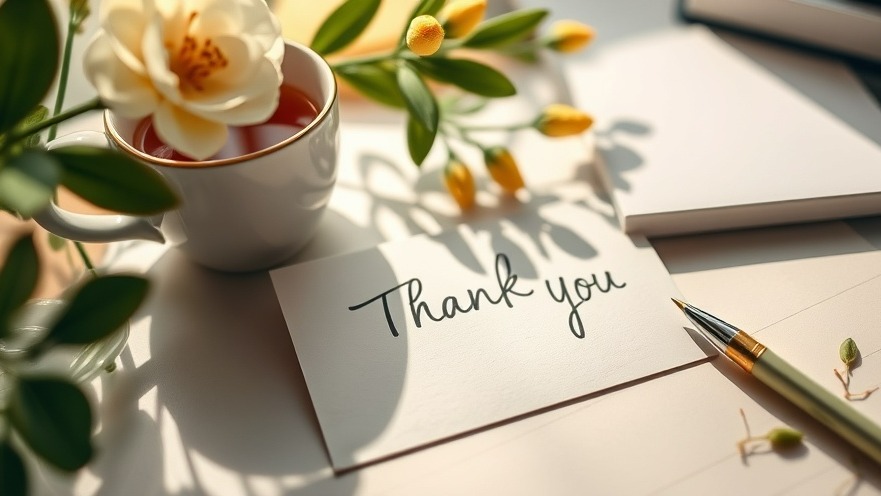
The Art of Thank You Notes: A Simple Gesture with Lasting Impact
In a world dominated by digital communication, the charm of a handwritten note often gets lost to the speed of emails and texts. Yet, receiving a thank-you note—especially from a physician—can evoke an enduring sense of appreciation. This practice, though seemingly small, can redefine the patient-doctor relationship, fostering loyalty and trust. It demonstrates that beyond diagnostics and prescriptions, there exists a human touch to healthcare.
Why Personal Touch Matters in Healthcare
Healthcare is increasingly becoming a transactional experience. Patients often feel like just another statistic in a doctor's busy schedule. However, a personal touch, like a thank you note, can pivot the patient experience from mundane to memorable. According to recent studies, personalized communications can enhance patient satisfaction by 20% or more. A simple handwritten note not only expresses gratitude but also reinforces the message that patients are valued individuals; they are not merely numbers fostered by insurance claims. This approach helps in building a community around your practice.
Recognizing Your Team: The Ripple Effect of Gratitude
Gratitude isn’t just for patients. Recognizing the extraordinary efforts of your staff through handwritten notes can significantly boost morale. When a practice administrator goes the extra mile or a nurse provides outstanding care, a thank-you note from the physician can make a world of difference. These gestures foster a culture of appreciation, promote teamwork, and encourage a positive atmosphere that inevitably reflects in patient satisfaction.
Practice Makes Perfect: How to Implement Thank You Notes
Implementing thank you notes may seem straightforward, but making it a routine requires intentionality. Begin by keeping thank you cards readily available in your office. Make it a habit to write a note at the end of each day recognizing someone’s effort—be it a team member or a patient. Consider sending them home instead of leaving them on a desk. This small effort goes a long way, signaling to the individual that they are genuinely cared for and appreciated.
The Psychological Benefits Behind Gratitude
According to psychologists, gratitude not only benefits the recipient but the giver as well. Engaging in gratitude practices can reduce stress, improve overall mood, and enhance relationship satisfaction. This cycle of appreciation creates a healthier environment for both patients and practitioners. When healthcare providers express their gratitude, they cultivate a more compassionate workplace that thrives on connection and empathy.
Making It Personal: An Inspirational Anecdote
Take, for example, the story of a concierge medicine physician who transformed her practice through the art of gratitude. After adopting a routine of sending thank-you notes to her patients, she noticed a significant increase in positive feedback and loyalty. One patient described feeling an overwhelming sense of care simply from receiving a note acknowledging their commitment to follow healthy habits. It’s experiences like this that remind us of the potential power our words hold.
Encouraging Lasting Connections: The Future of Patient Relations
As we move further into a technology-driven healthcare era, retaining a human connection becomes more critical than ever. Practices that embrace personal touches such as thank you notes are likely to see enhanced relationships with their patients and staff. This practice could be pivotal in reclaiming the essence of healthcare—where patient experiences are integral to operational growth.
Conclusion: Start Your Gratitude Journey Today
Implementing a gratitude system within your healthcare practice can deepen connections and enrich the patient and team experience. Start small; incorporate handwritten notes into your routine. In time, this singular act may cultivate a thriving community built on appreciation, making both patients and providers feel valued. As you embark on this journey, consider taking that extra moment to write a thank you note—it might just be the gesture that transforms your practice.
 Add Row
Add Row  Add
Add 






Write A Comment